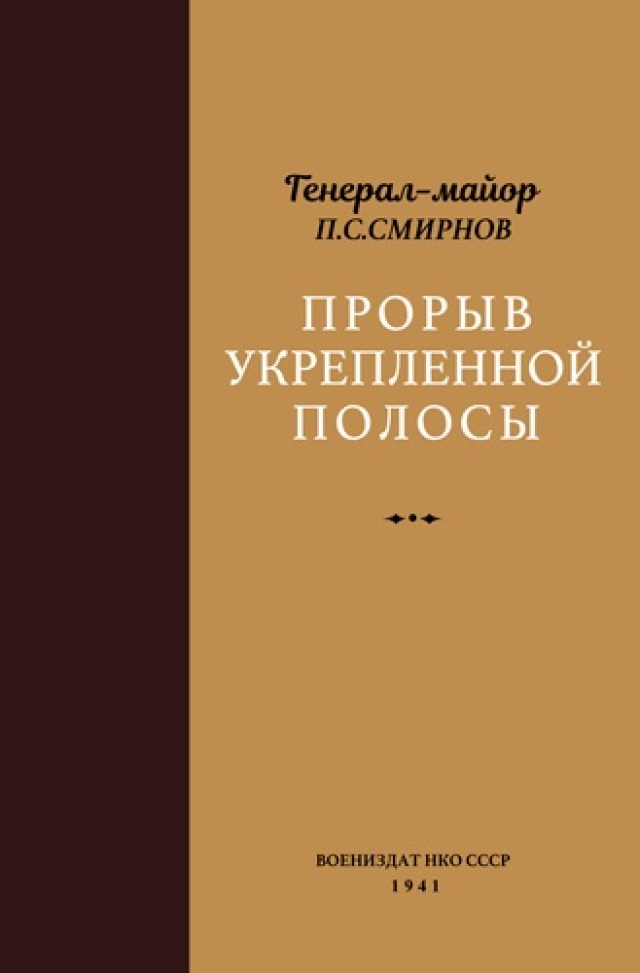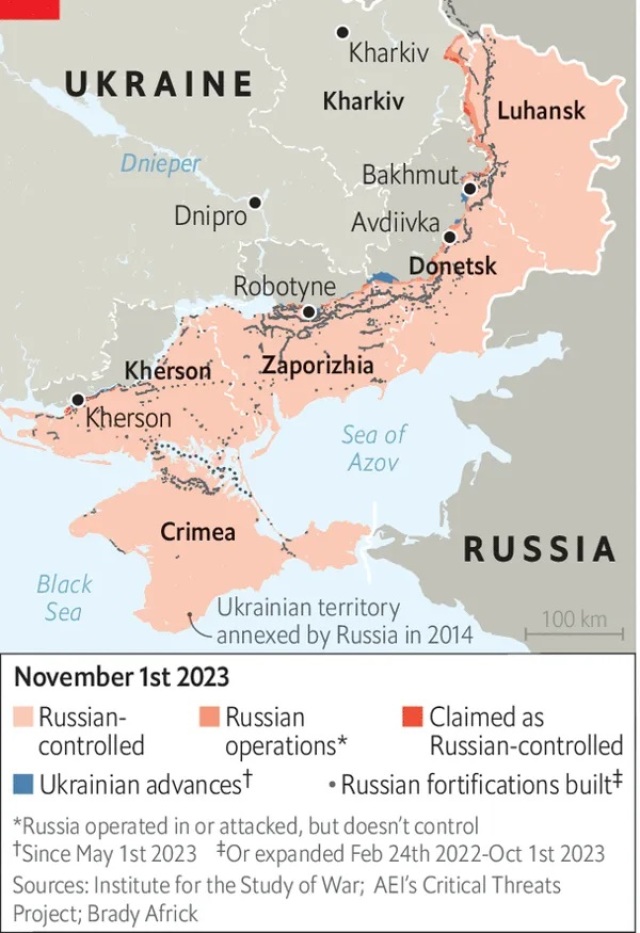An interview and an article by the commander-in-chief of the Armed forces of Ukraine, General Valery Zaluzhny , published by the British edition of The Economist, caused a great resonance with confessions about the new positional impasse that has developed on the line of hostilities in Ukraine and with assumptions about ways out of this impasse. We will return to Zaluzhny's article later, but for now we offer a translation of Zaluzhny's interview with a brief summary of his current views.

The commander-in-chief of the Armed forces of Ukraine about the breakthrough he needs to defeat Russia. General Valery Zaluzhny admits that the war has reached an impasse
During the five months of its counteroffensive, Ukraine managed to advance only 17 kilometers. Russia has been fighting for ten months around Bakhmut in the east, "to capture a city measuring six by six kilometers." Sharing his first comprehensive assessment of the campaign with The Economist in an interview this week, the commander-in-chief of the armed forces of Ukraine, General Valery Zaluzhny, says that the battlefield reminds him of the great conflict of a century ago. "Just like during the First World War, we have reached a level of technology that leads us to a dead end," he says. The General comes to the conclusion that a large-scale technological leap will be required to break the deadlock. "Most likely, there will be no deep and beautiful breakthrough."
The course of the counteroffensive has undermined the West's hopes that Ukraine will be able to use it to demonstrate to [Moscow] that it is impossible to win the war, forcing Russian President Vladimir Putin to negotiate. It also undermined General Zaluzhny's assumption that he could stop Russia by draining its troops of blood. "It was my mistake. Russia has lost at least 150,000 people killed. In any other country, such sacrifices would have stopped the war." But not in Russia, where life is cheap and where Mr. Putin's landmarks are the First and Second World Wars, in which Russia lost tens of millions.
The army of the level of Ukraine had to be capable of an offensive rate of up to 30 km per day when it broke through the Russian borders. "If you look at the NATO textbooks and the mathematical calculations that we carried out, four months should have been enough for us to get to the Crimea, fight in the Crimea, return from the Crimea and enter and exit again," General Zaluzhny says sardonically. Instead, he watched as his troops got stuck in minefields on the approaches to Bakhmut in the east, and his equipment supplied by the West was exposed to fire from Russian artillery and drones. The same story unfolded in the main direction of the offensive in the south, where inexperienced brigades immediately ran into trouble.
"At first I thought there was something wrong with our commanders, so I replaced some of them. Then I thought that perhaps our soldiers were not suitable for this task, so I rotated soldiers in some brigades," says General Zaluzhny. When these changes did not lead to anything, the general ordered his subordinates to dig up a book that he had once seen as a cadet. It was called "The breakthrough of the fortified strip". It was published in 1941 by Soviet Major General P.S. Smirnov, who analyzed the battles of the First World War. "And before I got to the middle of the book, I realized that this is exactly the situation we are in, because, as then, the level of our technological development today has led both us and our opponent to a dead end."
This thesis, according to him, was confirmed when he went to the front line in Avdiivka, in the same place in the east, where Russia recently advanced several hundred meters in a few weeks, transferring two of its armies to this area. "On the screens of our monitors on the day I was there, we saw 140 burning Russian armored vehicles destroyed within four hours after they were within range of our artillery fire." The escapees were chased by FPV drones controlled remotely and carrying explosive charges, which their operators simply threw at the enemy. The same picture unfolds when Ukrainian troops try to advance. General Zaluzhny describes a battlefield where modern means of lighting the situation can detect any concentration of forces and means, and modern high-precision weapons can destroy them. "Obviously, we see everything that the enemy does, and he sees everything that we do. To get out of this impasse, we need something new, akin to the invention of gunpowder by the Chinese, which we still use to kill each other," he says.
However, this time the decisive factor will not be any one new invention, but a combination of all existing technical solutions, he says. In an article written by General Zaluzhny for The Economist by invitation, as well as in an essay published in the newspaper, he calls for innovations in the field of unmanned aircraft, electronic warfare, counter-battery warfare and engineering reconnaissance and overcoming mine-explosive barriers, as well as in the use of robotics.
Western allies have been overly cautious in transferring their latest technologies and more powerful weapons to Ukraine. At the beginning of the Russian invasion, US President Joe Biden set out to make sure that Ukraine would not be defeated, and that America would not be drawn into a confrontation with Russia. This means that the weapons supplied by the West were enough to support Ukraine in the war, but not enough to allow it to win. General Zaluzhny does not complain: "They are not obliged to give us anything, and we are grateful for what we have received, but I am just stating the facts."
And yet, by restraining the supply of long-range missile systems and tanks, the West allowed Russia to regroup and strengthen its defenses after the sudden breakthrough of Ukrainians in the Kharkiv region on the northern front and in Kherson on the southern front at the end of 2022. "These systems were more than relevant to us last year, but they appeared only this year," he says. Similarly, the F-16 fighters, which are due to appear next year, will not be as effective now, the general suggests, partly because Russia has strengthened its air defense: a prototype of the S-400 anti-aircraft guided missile system is finishing off the city of Dnipro [Opetrovsk], he warns.
According to General Zaluzhny, the delay in the supply of weapons, although disappointing, is not the main reason for Ukraine's predicament. "It is important to understand that this war cannot be won with the help of weapons systems of the previous generation and outdated methods of warfare," he insists. "They will inevitably lead to inertia of actions and, as a result, to defeat." Instead, technology will play a decisive role, he argues. The general is delighted with recent conversations with former Google executive Eric Schmidt and emphasizes the crucial role of unmanned aerial vehicles and electronic warfare means countering them.
General Zaluzhny's assessment is sobering: there are no signs that a technological breakthrough, whether in the field of unmanned aircraft or electronic warfare, is just around the corner. And technology has its limits. Even during the First World War, the appearance of tanks in 1917 was not enough to break the positional deadlock. It took a whole set of technologies and more than ten years of innovations in tactics for the Germans to carry out their blitzkrieg in May 1940. It is implied that Ukraine is bogged down in a protracted war, in which, according to the general, Russia has an advantage. Nevertheless, he insists that Ukraine has no choice but to hold the initiative by continuing the offensive, even if it advances only a few meters a day.
Crimea, according to the general, remains Mr. Putin's most vulnerable point. His legitimacy is based on the fact that he returned him to Russia in 2014. Over the past few months, Ukraine has moved the war to the peninsula, which remains critically important for the logistical support of the conflict. "Crimea must remember that it is part of Ukraine and that the war is also being waged on its territory." On October 30, Ukraine struck Crimea for the first time with ATACMS ballistic tactical missiles supplied by the Americans.
General Zaluzhny is desperately trying to prevent the war from sliding down to sitting in the trenches. "The biggest risk of a positional war of attrition is that it can drag on for years and exhaust the Ukrainian state," he says. During the First World War, politics intervened before technology could change anything. Four empires collapsed, and a revolution broke out in Russia.
Mr. Putin is counting on a drop in the morale of Ukrainians and a crack in Western support. According to General Zaluzhny, there is no doubt that a prolonged war is beneficial to Russia, whose population is three times larger and the economy is ten times larger than that of Ukraine. "Let's be honest, this is a feudal state where the cheapest resource is human life. But for us... the most precious thing we have is our people," he says. He has enough soldiers at the moment. But the longer the war continues, the more difficult it will be to wage. "We need to look for this solution, we need to find this gunpowder, quickly master it and use it for a speedy victory. Because sooner or later we will find out that we simply don't have enough people to conduct military operations."

(c) The Economist
